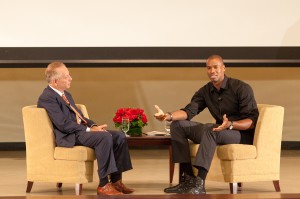Jason Collins discusses his experiences as a gay athlete
Jason Collins has thrown the first pitch at Fenway. He’s introduced the first lady. And he’s talked on the phone with President Obama and Oprah — on the same day.

Proud · Jason Collins is the first male athlete in the National Basketball Association to have publicly come out as gay. – Daniel Rothberg | Daily Trojan
But on Thursday, Collins, who came out as the first openly gay male athlete in a major professional sport, shared stories from the 33 years leading up to his announcement, and his life since, during a conversation at the Keck School of Medicine.
The event, which was part of the Dean’s Distinguished Lecturer Series, focused on Collins’ experience coming out, the reaction that followed and his new place as a role model within the lesbian, gay, bisexual and transgender community. For over an hour, Collins spoke in a conversation with Carmen A. Puliafito, dean of the Keck School.
Until this year, Collins, an NBA player for 12 years, said he had never revealed his sexuality to another person.
“For 33 years, I never told another soul,” Collins said. “I had a lot of great conversations with my German Shepherd, Shadow, sitting around watching TV.”
During the conversation, Collins spoke about what it was like being gay in the culture of athletics.
“People will just associate the worst stereotypes with being gay,” Collins said. “And, yeah, I heard a lot of conversations in the locker room.”
Collins said he took that as reason to play more intensely.
“It made me play that much harder, so if and when the day came that I did have the courage to speak up, it would challenge all of those teammates as far as what it means to be gay.”
Collins was a fitting speaker, Puliafito said, because discrimination can be an obstacle in the workplace.
“It’s great to have an opportunity to talk to someone like Jason Collins who’s really a role model for people dealing with who they are and being honest with who they are without fear of disrespect,” Puliafito said.
Collins first came out in an email to a trainer who he saw in an “It Gets Better” video. He sent the email the Saturday after Thanksgiving, during the 2011 NBA lockout.
“It was the first time where basketball really wasn’t part of my life,” Collins said. “I’m training, but I’m thinking, ‘Am I going to go through the rest of my life like this?’”
About an hour after he clicked send on the email, Collins said he found out that the lockout had been lifted.
“I was like ‘Oh, dear God, what have I done?’” he said as members of the audience laughed.
Collins likened coming out to taking off a mask, a phrase he first heard Oprah use. Collins said he no longer had to lie about girlfriends or censor what he said for fear of it sounding stereotypically gay.
“I don’t have to go through that any more and mentally, I think I will be even better as a player.”
Collins said when he came out publically in Sports Illustrated last April he wasn’t sure, as a black player, what type of response to expect from the black community.
“As far as support from the African American community, traditionally, it has been harder to accept being gay,” Collins said. “But I think slowly, as more of us step forward and take it from being some abstract thing … then people identify with, ‘We know them, we have some familiarity.’”
Vincent Vigil, the director of USC’s LGBT Resource Center, said that Collins serves as an important role model, both as an athlete and as a minority. During the event’s question and answer portion, Vigil said that when he met with incoming athletes, he asked them if they knew who Collins was.
“Every incoming athlete at USC raised their hand [to signify they know] who Jason Collins is,” Vigil told the audience. “You are truly making a difference and an impact in the lives of our youth but also changing the culture for the LGBT community.”
In an interview with the Daily Trojan after the event, Collins emphasized the importance of coming out to a trusted person rather than hiding one’s sexuality as he did for 33 years.
“I had the toughest time verbalizing it, just saying the words, ‘I’m gay,’” Collins said. “You have to tell someone so you have an ability to really be your true self with someone. And you’ll be shocked that your true self is actually pretty similar to [your] persona, [it’s] just that you don’t have to pretend to have a girlfriend or make up some story.”
Follow Daniel on Twitter @danielrothberg
